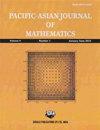作为弱Krull域的半群环
IF 0.7
3区 数学
Q2 MATHEMATICS
引用次数: 5
摘要
设D是一个积分域,Γ是一个具有单位元和商群G的无扭交换可消(加)半群。在本文中,我们证明了如果char(D)=0(分别为,char(D。此外,我们还给出了这一结果的算术应用。我们的结果表明,还有一类弱Krull域,它不是Krull,但具有全长度集系统。本文章由计算机程序翻译,如有差异,请以英文原文为准。
Semigroup rings as weakly Krull domains
. Let D be an integral domain and Γ be a torsion-free commutative cancellative (additive) semigroup with identity element and quotient group G . In this paper, we show that if char( D ) = 0 (resp., char( D ) = p > 0), then D [Γ] is a weakly Krull domain if and only if D is a weakly Krull UMT-domain, Γ is a weakly Krull UMT-monoid, and G is of type (0 , 0 , 0 ,... ) (resp., type (0 , 0 , 0 ,... ) except p ). Moreover, we give arithmetical applications of this result. Our results show that there is also a class of weakly Krull domains, which are not Krull but have full system of sets of lengths.
求助全文
通过发布文献求助,成功后即可免费获取论文全文。
去求助
来源期刊
CiteScore
1.30
自引率
0.00%
发文量
93
审稿时长
4-8 weeks
期刊介绍:
Founded in 1951, PJM has published mathematics research for more than 60 years. PJM is run by mathematicians from the Pacific Rim. PJM aims to publish high-quality articles in all branches of mathematics, at low cost to libraries and individuals. The Pacific Journal of Mathematics is incorporated as a 501(c)(3) California nonprofit.

 求助内容:
求助内容: 应助结果提醒方式:
应助结果提醒方式:


